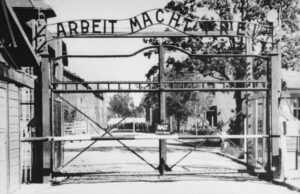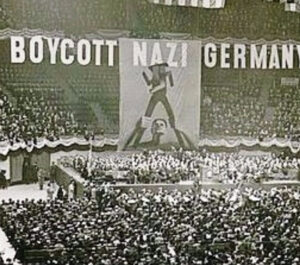
After the bait-and-switch bombing of Japan, the appalled leader of the Manhattan Project, J. Robert Oppenheimer, embarks on a public crusade for a future free of nuclear holocaust, thinking that great minds will save the people.

After the bait-and-switch bombing of Japan, the appalled leader of the Manhattan Project, J. Robert Oppenheimer, embarks on a public crusade for a future free of nuclear holocaust, thinking that great minds will save the people.

Bombing Auschwitz would not have diverted significantly from the actual war effort. It would have saved thousands or tens of thousands of lives and would have let the world know that Allied moral outrage was more than feel-good propaganda.

The Jewish establishment has condemned the NYC Democratic Socialists of America (DSA) for asking candidates if they would forgo plans to take trips to Israel as an act of solidarity with Palestinians. Of course it’s a croc. It’s also hypocrisy.

Japan’s 5.26 trillion-yen fiscal 2019 defense budget set a new record for the fifth straight year, as the country continued to beef up its armed forces while keeping a wary eye fixed on North Korea and China. The . . .

In 2019, the World Bank (WB) and the IMF will be 75 years old. These two international financial institutions (IFI), founded in 1944, are dominated by the USA and a few allied major powers who work to generalize policies that . . .

In 1996, at the height of the culture wars, Marvin Mandell joined the battle, writing a long essay, “Canon on the Left,” in which he argued that the left should not allow conservatives to claim the literary canon. While he of course supported the expansion of the canon to include all of the writers of color, as well as the women and all of the others who had been neglected and excluded, he refused to allow the right to claim the great tradition of European literature. He concluded the essay with these words:
 For some time now, many of us have wondered how it is that a number of left-wing writers and some political organizations could support Vladimir Putin and the Russian government’s role in international affairs.
For some time now, many of us have wondered how it is that a number of left-wing writers and some political organizations could support Vladimir Putin and the Russian government’s role in international affairs.
In a surprisingly warm and positive obituary, the New York Times noted the death of Michael Wreszin in August of this year. The obit says of Wrezin’s writings, “His subjects were cosmopolitan, humanist thinkers who saw a growing militarism in American political culture but whose scrupulous habits of mind could make them misfits in the ideological camps they joined.” Mike Wreszin was a frequent contributor to New Politics. We miss him already.
The book’s title translates a term, "Rote Kapelle," that the Gestapo applied to a relatively small circle of men and women in Berlin, active in seeking to weaken the political authority of the Hitler regime during the 1930s and early 1940s. The term, however, was meant to convey the notion that the group was involved in a Soviet conspiracy — a notion that survived the war and was perpetuated in the ensuing climate of a public opinion shaped by the cold war and hostility to the Soviet Union.
[The publication in 1963 of Eichmann in Jerusalem: A Report on the Banality of Evil by Hannah Arendt provoked a storm of controversy which has been going on for decades. Arendt, the author of the famed The Origins of Totalitarianism claimed that Eichmann, organizer of the Holocaust, was not a fanatic who hated Jews but a normal man, and that Jewish leaders and organizations cooperated with him to an extraordinary degree.
We are witnessing today a paradoxical and unsettling phenomenon: the rise of fascist-inspired political movements in the European arena (from France to Italy, from Belgium to Austria), accompanied, in the heart of intellectual circles, by a massive campaign to denigrate the entire anti-fascist tradition.
Kathryn Bigelow, the director of The Hurt Locker, claims that many men in Iraq and Afghanistan are addicted to war. If this is true, could it have something to do with the fact that GIs today do not face the endless bombardment from airplanes, field artillery, and tanks that World War II soldiers did?
I served in the 88th Infantry Division in Italy and I never met anyone so addicted. Had we met someone like that we would have considered him “Section 8,” that is, seriously disturbed.
Does that mean that many gung-ho GIs now serving in Iraq and Afghanistan are Section 8?
On February 13, 1998, Bulgarian President Petar Stoyanov accepted on behalf of his ex-Communist nation the Courage to Care Award, which the Anti-Defamation League (ADL) had bestowed upon Bulgaria in recognition of the heroism of its people in saving Bulgarian Jews during World War II.